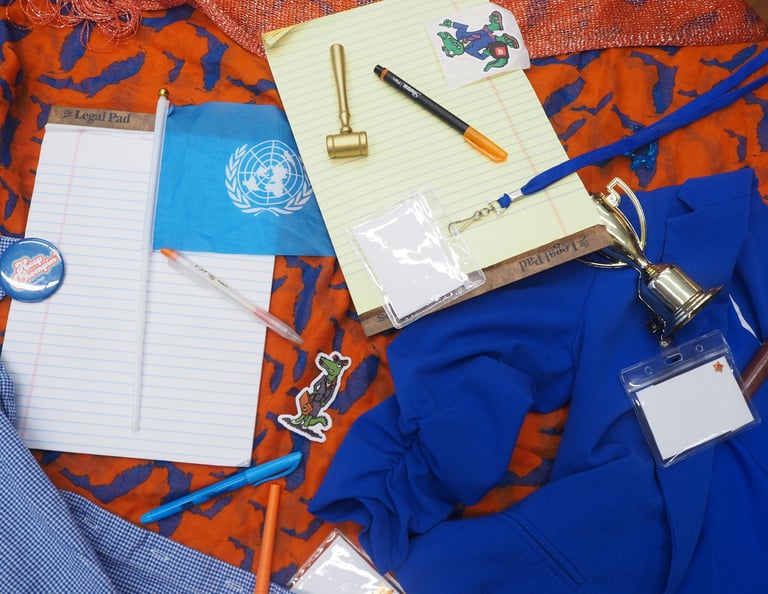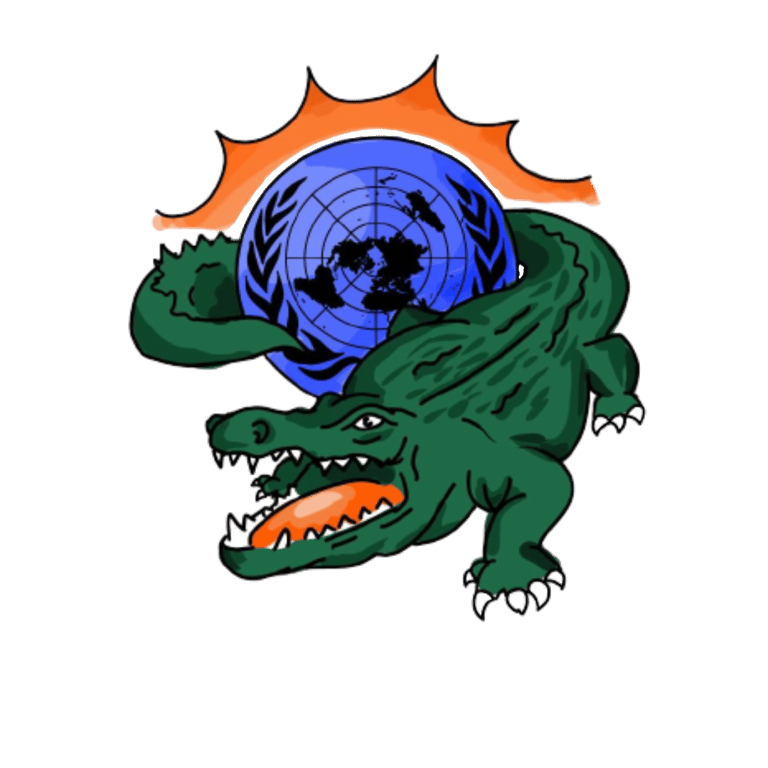SunMUN is thrilled to present eight unique and exciting committees for your delegates to immerse themselves in. Learn more about each committee before background guides are published in November.


Committees
General Assembly
Silent Casualties
Preserving Environment and Heritage amidst Conflict
Director: Naveen Siddiqui
In modern warfare, the global battlefield stretches far beyond bullets and borders. Priceless cultural artifacts are looted and trafficked through private collectors and auction houses. Endangered species are poached and sold on international markets. Natural resources such as gold, timber, and rare minerals flow to global supply chains, often without any knowledge of the violence used to extract them. These activities do more than fund militias, steadily eroding cultural identity, destroying ecosystems, and prolonging economic conflict long after the first gunshot has been fired.
While international treaties and conventions have laid the groundwork for cultural preservation and environmental protection, serious gaps remain in enforcement, monitoring, and cooperation. Auction houses may struggle to verify provenance, peacekeeping operations may lack the tools to track illicit wildlife trade, and local communities may feel pressured to engage in unsustainable practices simply to survive during conflict.
This committee challenges delegates to confront these realities head-on and develop targeted, action-oriented solutions. How can Member States coordinate more effectively to track and stop the trade in looted antiquities? What regulations can be implemented to prevent the sale of wildlife and minerals that finance armed groups? How do we balance preservation with local socioeconomic needs in war-affected regions?
Delegates will be expected to draw connections across sectors and think creatively about technology, legal frameworks, and peacekeeping mandates. Cultural heritage and environmental assets must not be treated as collateral casualties under fire, and this committee aims to ensure they are protected as essential pillars of peace.
Specialized
City Limits, Global Stakes:
The Global Parliament of Mayors, 2026
Director: Noelle Morey
Bohemian Rhapsody:
Congress of Vienna, 1815
These mayors mean business! A representative governance of the world’s local leaders, the Global Parliament of Mayors has been an official United Nations partner since 2007. Informing international decisions and working with key players on the global stage, the GPM serves as a platform to uplift local voices and amplify them to the world, envisioning a brighter future for the 4.2 billion people living in our world’s cities.
Delegates will represent the various cities incorporated into the GPM as they navigate the challenges of a changing metropolitan world - microclimate change, evolving industries, inadequate institutions - all through the lens of the individual mayors who pave the way. Designed as a mix of traditional general assembly procedures and dynamic crisis updates, this committee tasks delegates to transform into those who lead the international community to a better tomorrow, showing us what it truly means to think globally and act locally. Delegates, the urban world is in your hands!
In this committee, delegates will step into the roles of diplomats and leaders at one of the most influential international conferences in history: the Congress of Vienna. Traditionally convened to restore order after the Napoleonic Wars, this reimagined timeline offers a twist: Europe’s borders look unfamiliar, and Napoleon’s accent doesn’t quite sound French… instead, more Bohemian?
Delegates will navigate the turbulent aftermath of war, respond to rising movements, and craft new diplomatic strategies in the wake of Napoleon’s reign. Inspired by Victoria II’s Divergences of Darkness mod, this committee blends historical complexity with creative reimagination. Despite its alternate backdrop, delegates will find themselves in a grounded and intellectually rigorous setting, complete with unique specialized mechanics designed to test their strategic thinking and adaptability.
Will you guide Europe into a new era of stability, or cling to the past as the world moves on?
Directors: Gonzalo Palenzuela and Jackson Randolph
Crisis Committees
Sunline Entertainment: Korean-Pop Board of Directors
Director: Clara Roman
Defining Democracy:
Ross Perot, Charisma, and Conspiracy, 1992
Director: Tessa Jones
It’s Just One of Those Days:
The Pandemonium of Woodstock ‘99
Director: Hazel Parent
Team Rocket Blasting Off Again:
The Kanto Recovery Council
Directors: Alonzo Rojas & Douglas Plummer
Ad-hoc of the Secretary General
Directors: Hanan Levis-Betancourt
In a new trend of capitalizing off the recent hallyu wave, there have been talks of new entertainment companies. With a world-wide market, and millions of teenage girls to feed fantasies to, the potential basis for profit is almost guaranteed. This is not without hardships though as everything from managing artist controversies and contract disputes to navigating scandals, media backlash, and global market expansion, our new company will demand strategic thinking, strong PR instincts, and an eye for both innovation and image. Every move affects not just profits, but fan loyalty, artist well-being, and the reputation of the entire industry.
In Sun Line Entertainment, we will pride ourselves with managing not only Kpop groups, but the cultural force they have become. In this committee, delegates will be picking trainees, creating concepts to market, releasing music, and promoting the idols all while dealing with the public's perceptions. Be prepared to face all the negatives and positives of the industry in order to change them for the better.
In a political system dominated by two entrenched parties, the Reform Party emerged as a populist, anti-establishment force that dared to dream differently. This crisis committee places delegates at the heart of a grassroots insurgency led by Ross Perot—eccentric billionaire, short king media personality, and unlikely political legend. Delegates must organize and evolve a loosely defined movement into a competitive third party amid the turbulent landscape of 1990s American politics.
Beginning in the 1992 election cycle, delegates will tackle campaign infrastructure from scratch, building alliances with civic groups, media outlets, and coalitions while determining internal party management. Delegates will contend with Perot’s magnetic but unpredictable leadership, occasional paranoia, and a political press hungry for scandal. They must secure PAC money, court Democratic and Republican defectors, and connect with powerful industries—all while managing the optics of a “centrist” movement in a deeply divided country. The question is not just can the Reform Party survive—but can it win and alter the political landscape of the USA forever?
In July 1999, organizers of the original 1969 Woodstock festival, known for being a “celebration of peace, love, and music” aimed to emulate their success by hosting another rendition in Rome, New York. However, it was marred by a series of problems, including environmental issues, inadequate sanitation, security concerns, violence, and widespread vandalism and property damage. Although many media outlets blamed this chaos on the rowdy musicians performing at the venue, who were accused of instigating crowds, many of these issues can be tied back to failures in proper planning and safety by the event organizers. The festival, with its lasting reputation of being a disaster, is often cited as a turning point in the history of music festivals, highlighting potential challenges of large-scale events and the importance of properly vetting these issues.
Delegates will serve as a variety of figures involved with running the event, from organizers to musicians to media personalities. Will delegates be able to work together to prevent some of these catastrophes before they escalate to a point of major crisis? Or, will the festival fail to capture the original ideals of Woodstock and literally burn to the ground?
In the wake of Team Rocket’s most devastating campaign yet, the Kanto region lies fractured, its cities under martial law, Pokémon Centers seized, citizens held hostage region-wide and the region’s only champions scattered. The criminal syndicate has toppled the traditional gym system, occupied key Indigo League facilities, and now pursues their most dangerous ambition yet: the creation of the strongest Pokémon ever. With Johto and other regions nervously watching from across the borders, a desperate emergency summit has been called. Composed of Gym Leaders, Elite Four veterans, renowned Pokémon Professors, and iconic trainers from Kanto and Johto alike, the Kanto Recovery Kouncil is set on reclaiming the region, rebuilding its defenses, and halting Team Rocket’s expanding dominion before it swallows the Pokémon world whole.
As delegates of this high-stakes council, participants must navigate the ethical and strategic chaos of a post-invasion Kanto. Should the Master Ball be located and destroyed… or maybe even used? Can peace be brokered with rogue Rocket defectors? Is the militarization of Pokémon training justified in the face of totalitarian control? With Rocket’s power looming, the fate of both humanity and Pokémon hangs in the balance. Delegates will not only engage in diplomacy, strategy, and war planning, but confront a deeper question at the heart of this crisis: what kind of world do we want Pokémon to fight for, and who has the right to command it? And most importantly, who’s that Pokémon?
